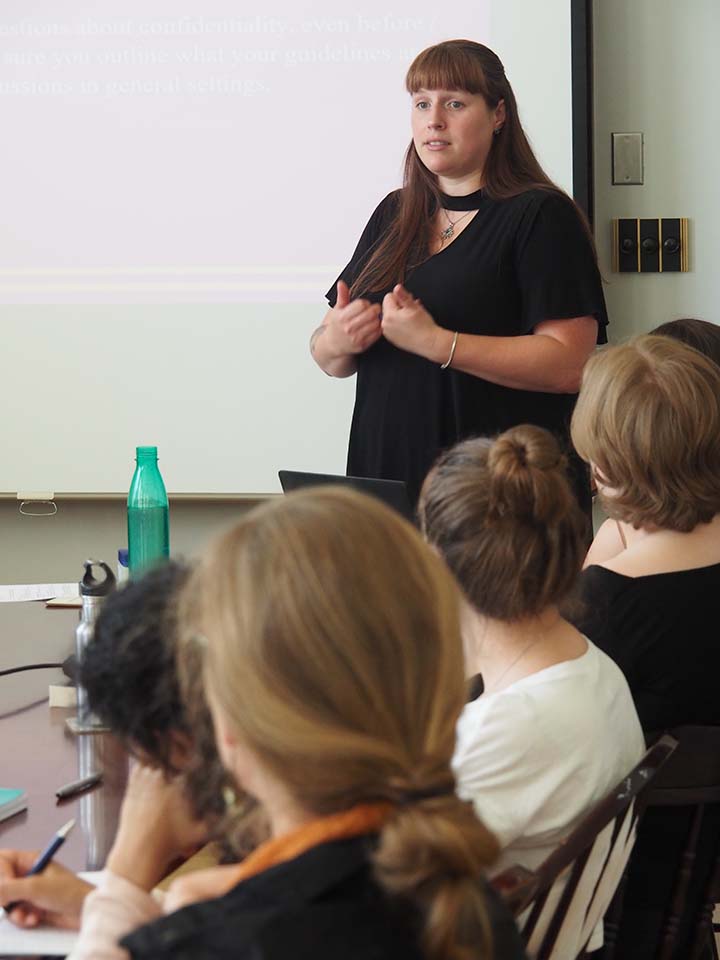
Jordan Roberts became King’s first Sexualized Violence Prevention and Response Officer (SVPRO) in August. She came from the YWCA where she was Program Coordinator – Supportive Housing for Young Mothers. Her background also includes working for Adsum for Women and Children, and the Elizabeth Fry Society of Nova Scotia. She’s also been a member of a volunteer doula program for past five years.
Jordan Roberts is wasting no time getting started. In her second week on the job as King’s new Sexualized Violence Prevention and Response Officer (SVPRO), she is training residence dons on the topic of trauma-informed listening and first response.
“The thesis for that training is that you always have to be a soft first place to land. You’re not going to solve everyone’s problems in one conversation, in one month, or even in one year, but you can be a place where someone can share what’s happened to them and they don’t have to experience victim blaming, a myriad of questions, finger pointing, or blame or shame,” Roberts says. “They can just tell their story and have someone present to receive that, to offer some kind words, some compassion and maybe a little information. I think that’s what this position can build across campus—more safe spaces to land.”
Roberts’s position was created in conjunction with the drafting of King’s Sexualized Violence Policy. This policy was mandated by the Province of Nova Scotia (all N.S. universities are required to create such a policy) and was written collaboratively by students, faculty and staff. The Board of Governors approved it in December 2018.
While Roberts is quick to point out that King’s has always worked to prevent and respond to sexualized violence on campus, and has long had an equity officer, dean of students and residence dons on the front-line, her stand-alone position is more advocacy-oriented and focused.
“Start with ‘thank you, I believe you, it’s not your fault.’ “
“A lot of the work I’ll be doing in these initial moments is building trust,” she says. “My job is to make sure everyone on campus knows who I am, knows [about] the office [located in room 077 in the lower Link], what it can provide.”
In addition to providing coordination, support and services for those who have experienced sexualized violence, Roberts will receive disclosures and reports, facilitate safety planning, and develop awareness, education and training programs for all members of the King’s community.
When someone tells you they’ve experienced sexualized violence, thank them
But she doesn’t expect—or want—to become the only person on the front-line.
“People will continue to disclose to the people they feel most comfortable disclosing to. A faculty member, a co-worker, a colleague, a peer. At this point I wouldn’t want, in the goal of building trust, for the answer to be ‘Bring that to me.’ ”
Rather, Roberts wants people receiving disclosures to have the tools to support that person, or to know they can send that person to her office for support.
“In my opinion, the best first response is thanking someone who’s disclosed. The number of barriers this person has walked through…to finally get to a place where they trust someone enough to share that information with them, I think that you really need to honour that trust and honour that courage. Start with ‘Thank you. I believe you. It’s not your fault.’ ”
Providing community-wide support
Roberts also emphasizes that she’s not just available to support those who’ve experienced sexualized violence directly. She’ll also address secondary trauma by supporting those who’ve received disclosures. Respondents, too, will have access to supports and services. “The policy is great in that it creates a space for that. It’s well done by King’s,” Roberts says.
At 31 pages long, the Sexualized Violence Policy is thorough. King’s has an implementation committee, again comprised of students, faculty and staff, that is now working on how to use the policy. “Staff, students, faculty members, the plan will be different for all. We want to get it out there accessibly and in the most relevant ways for those trying to access that information…It could be as simple as knowing the right person to come to,” Roberts says.
She also adds that her office serves as a resource centre. Faculty can find materials to support what they’re teaching in class. And she’s creating space for zines, books, articles and can recommend online resources, e.g., that explain the term “rape culture.”
When asked about the need for her position at King’s now, Roberts, who’s quick to smile and laughs often, grows pensive. It’s not necessarily, she says, that the problem has worsened, but that awareness has grown.
“Sexual assault has always been a concern on campus…I don’t think the tensions are King’s-specific. They’re universities-specific. We’re hearing more. More perpetrators are being held accountable, whether convicted or not. More celebrities and public figures in the news are being named [and] the more people who come forward and name their experience, there are many ways that can be retraumatizing, but it’s also a powerful cycle. People stepping forward and having the courage inspires others to do the same.”

